This post may contain affiliate links that at no additional cost to you, I may earn a small commission.
Is Dove Cruelty-Free?
🐰 Dove is a *cruelty-free brand. None of Dove’s ingredients or products are tested on animals. Dove has met all the criteria in our Cruelty-Free Checklist and is included in our Cruelty-Free Directory.
Does Dove Test on Animals?
When asking, does Dove test on animals? We must look beyond to ensure none of Dove’s ingredients or suppliers test on animals. And they don’t sell in any conditions that may require animal testing by law.
In our research, we discovered the following:
- ✓ Dove confirmed they do not test their products or ingredients on animals or ask others to test on their behalf.
- ✓ Dove confirmed all their ingredient suppliers do not test on animals
- ✓ Dove confirmed they do not allow or sell their products under conditions where animal testing is required by law
By meeting all of our Cruelty-Free Criteria, Dove is a *cruelty-free brand by our standards.
*Dove is owned by Unilever, a corporation that is NOT cruelty-free because they allow some of their other brands to test on animals.
The decision is yours whether you want to support or boycott cruelty-free brands owned by a parent company that is not cruelty-free. There is no ‘right’ or ‘wrong’ answer to this. Do what you’re comfortable with. I just thought it was important to disclose that Unilever owns Dove.
What is Dove’s Animal Testing Policy?
Below is a screenshot of what’s currently stated on Dove’s website about its animal testing policy:
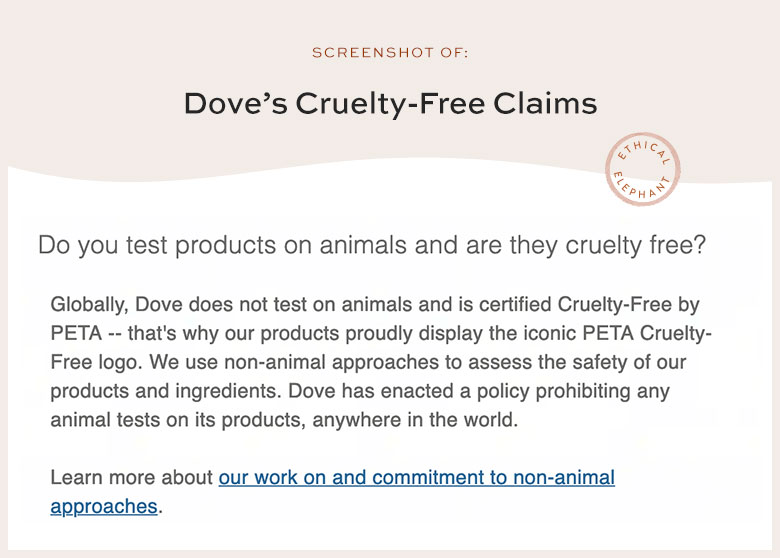
Animal Testing in China – 2023 Update!
With the recent changes to China’s animal testing laws, cosmetic companies can now export and sell some of their cosmetics in China without animal testing only if they meet ALL of the following preconditions first.
- ONLY sell ‘general’ cosmetics (like makeup, skincare, haircare, nail polish, and perfumes)
- must NOT sell any ‘special’ cosmetics like sunscreens, hair dye, hair perming, or other cosmetics claiming new efficacy
- must NOT sell products designed for infants or children
- must NOT sell products that contain a ‘New Cosmetic Ingredient’
- AND if post-market testing is required, then the company must have a policy in place where it will RECALL its products rather than allow its products to be tested on animals
Also, products must meet ONE of the following in order to avoid animal testing in China:
- manufactured in China, or the final assembly is in China
- if manufactured outside of China and then exported to China, companies must obtain the proper product safety certificates and documents
To avoid animal tests, Dove has confirmed it only sells general cosmetics that were domestically manufactured in China.
Dove also states that in the unlikely event that post-market testing is needed, they have “requested to the Chinese Authorities that they notify us if there were such a concern, so we can withdraw the product rather than it be subject to animal testing.”
Follow the highlighted lines in the graphic below to see how Dove avoids animal tests while selling some of its cosmetics in China.
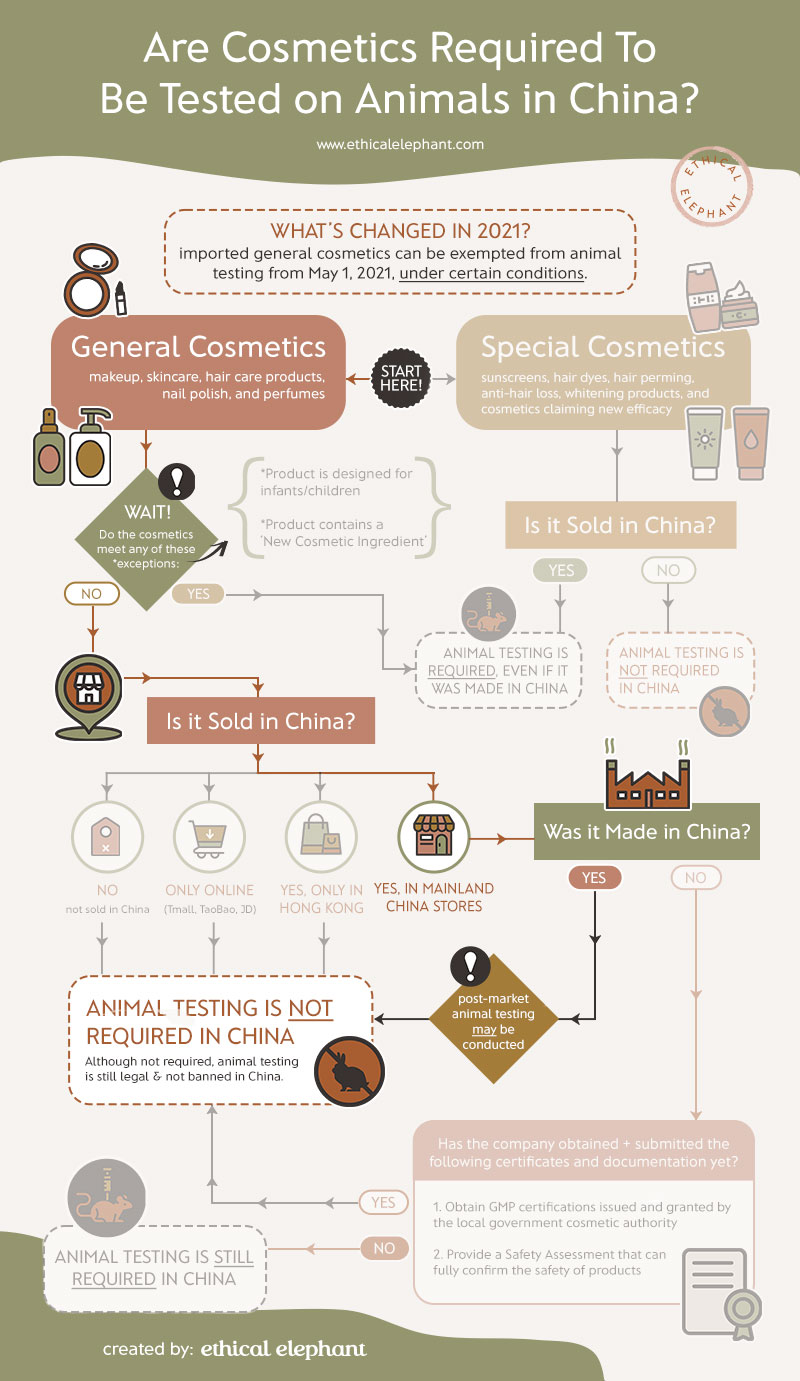
For a detailed break down of Dove’s statements and responses to selling in China while remaining cruelty-free, continue reading.
Is Dove Certified Cruelty-Free?
Dove is certified cruelty-free by PETA, but Dove is not Leaping Bunny certified.
Is Dove Sold in China?
On Dove’s website, the brand confirmed its products are indeed sold in China and acknowledge that Chinese law requires animal testing.
“As you may or may not know, the Chinese government requires animal testing of products not made in China before they’re released for purchase in China. While we disagree with the stance they’ve taken — and we’d be happy to show them why it’s unnecessary — we nonetheless respect their position. This is why we’ve stopped importing products into China that weren’t made there.” (Source)
As of 2014, ‘general’ cosmetics manufactured & sold in China are no longer required to be tested on animals.
This only applies to ‘general cosmetics’ like body lotions, lipsticks, and nail polish. But all special cosmetics like sunscreens, whitening products, hair dyes, antiperspirants, and cosmetics claiming new efficacy are all still required to be tested on animals in China.
This is confirmed by Dove in an email response when I asked for further clarifications:
“Thank you for contacting Dove. The Chinese Authorities changed their regulations in 2014, and now allow for certain types of cosmetic products that are manufactured in China not to require animal testing.
From December 2017 onwards, we are no longer importing new products into China that would require animal testing according to Chinese regulations. All the products Dove launching in China in the future will fall in the category where animal testing is not a requirement, or will be sold through cross-border e-commerce channels which do not require animal testing by Chinese authorities.
By no longer importing its cosmetics in China and moving its manufacturing of general cosmetics to China allows Dove to sell in China without pre-market animal testing.
Post-Market Testing in China
In the event of a customer complaint, Chinese officials will administer product safety tests that may or may not involve animal test subjects.
I asked Dove about the risk of post-market testing and how they’re handling these concerns. They told me,
“Post-market testing would only be required in the rare occurrence of a serious consumer safety concern. We have requested to the Chinese Authorities that they notify us if there were such a concern, so we can withdraw the product rather than it be subject to animal testing.
For background:
- We are not aware of any post-market animal testing ever having been conducted on a Unilever product
- The Chinese and UK authorities have assured us that this testing is hypothetical (all government authorities reserve the right to do this in market incident situations)
- Any analysis/testing would only be considered if there were a serious consumer safety incident, and we would engage in dialogue on how product safety had been assessed prior to any testing be carried out
- As part of the PETA accreditation of Dove a letter was sent to Chinese authorities requesting that, in the unlikely event of post-market testing being suggested on a Dove product, that we are notified prior to any testing so that we can withdraw that product. “
Dove bypassed China’s mandatory animal tests on cosmetics by manufacturing its ‘general cosmetics’ in China.
🔍 2023 UPDATE!
With China’s recent updates to its animal testing regulations, I have decided to move a few select brands back onto our Cruelty-Free Brand Directory, only if they are transparent about their business operations while selling in China.
As a result, I believe Dove is truly cruelty-free, and the brand is transparent about selling some of its domestically-manufactured, general cosmetics in China without testing on animals. Therefore, I have decided to move Dove from a Grey Area Brand to a *Cruelty-Free Brand with Vegan Options.
*Cruelty-Free – But Owned By An Animal-Tested Parent Company
Cruelty-Free Policies 2023
Just because a brand claims it is ‘Cruelty-Free,’ doesn’t always mean that’s the case.
That’s because there is no legal definition for the label ‘Cruelty-Free.’ It can mean different things to different people. But Cruelty-Free is generally used to imply no animal testing. More specifically, the ingredients, formulation, or finished product are not tested on animals at any stage of product development.
At ethical elephant, we always assess a company’s cruelty-free policy using our Cruelty-Free Checklist. This ensures no animal testing was performed by the brand itself, its suppliers, or any third parties.
How We Assess Cruelty-Free Policies
Since 2015, the start of my blog, I’ve been emailing companies asking about their animal testing policies and cruelty-free commitments.
And based on the responses I receive from companies, I’ll research to find any supporting facts needed before concluding whether the brand should be classified as “Cruelty-Free,” “Animal-Tested,” or “Grey Area – Unclear Policies.”
☕️ Every week, I continue to reach out to new brands while trying my best to keep current brands updated. If you found any of my posts or guides helpful, consider Buying Me A Coffee! I would greatly appreciate it! ❤️
What about Vegan?
Just because something is called Cruelty-Free, doesn’t always mean it’s Vegan. And vice versa.
Cruelty-Free only refers to no animal testing, while Vegan means formulated without animal products.
Some brands are Cruelty-Free, but not Vegan.
And some are Vegan, but not Cruelty-Free.
Another important distinction to know is, Vegan in cosmetics can refer to an entire brand is 100% Vegan or a specific product is Vegan.
Is Dove Vegan?
⭐️ Dove is NOT an entirely vegan brand. But Dove offers some vegan options that are free of animal products.
How to know which of Dove’s products are vegan?
All of Dove’s vegan products are clearly marked on their website.
The following is a screenshot of what’s currently stated on Dove’s website about its vegan claims:
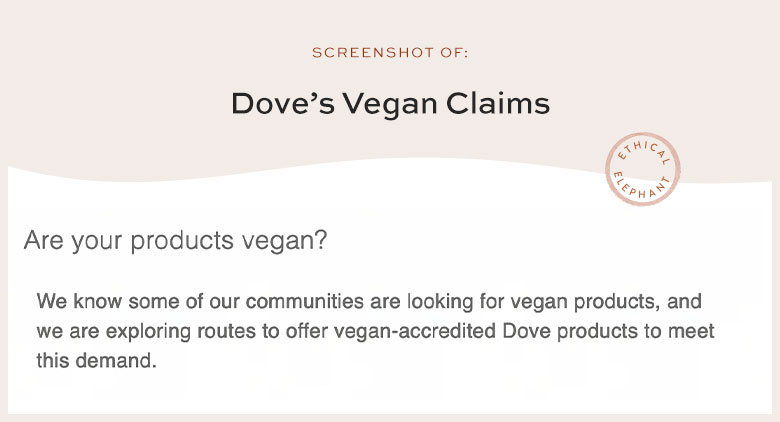
Where to buy Dove? Check out Target and Amazon!
Vegan Policies
Similar to ‘Cruelty-Free,’ there is no standard or legal definition for the label ‘Vegan.’ But Vegan is generally used to mean formulated without animal-derived ingredients or animal by-products.
Some common animal products in cosmetics include carmine, lanolin, snail mucus, beeswax, honey, pearl or silk-derived ingredients, animal-based glycerin, keratin, and squalene.
There are plant-based and synthetic alternatives to animal-derived ingredients. But unless a brand explicitly labels its ingredients or product as Vegan, it’s often difficult to know with certainty whether a product is vegan just by reading the ingredient list.
So it’s best to ask the company and manufacturers to ensure the ingredients they chose were from non-animal sources.
I hope this article helped you to understand Dove’s cruelty-free and vegan status and by choosing cruelty-free together, we can help end animal testing for cosmetics once and for all!
If you found this helpful, consider Buying Me a Coffee. So that I can continue to keep this site running and updated.






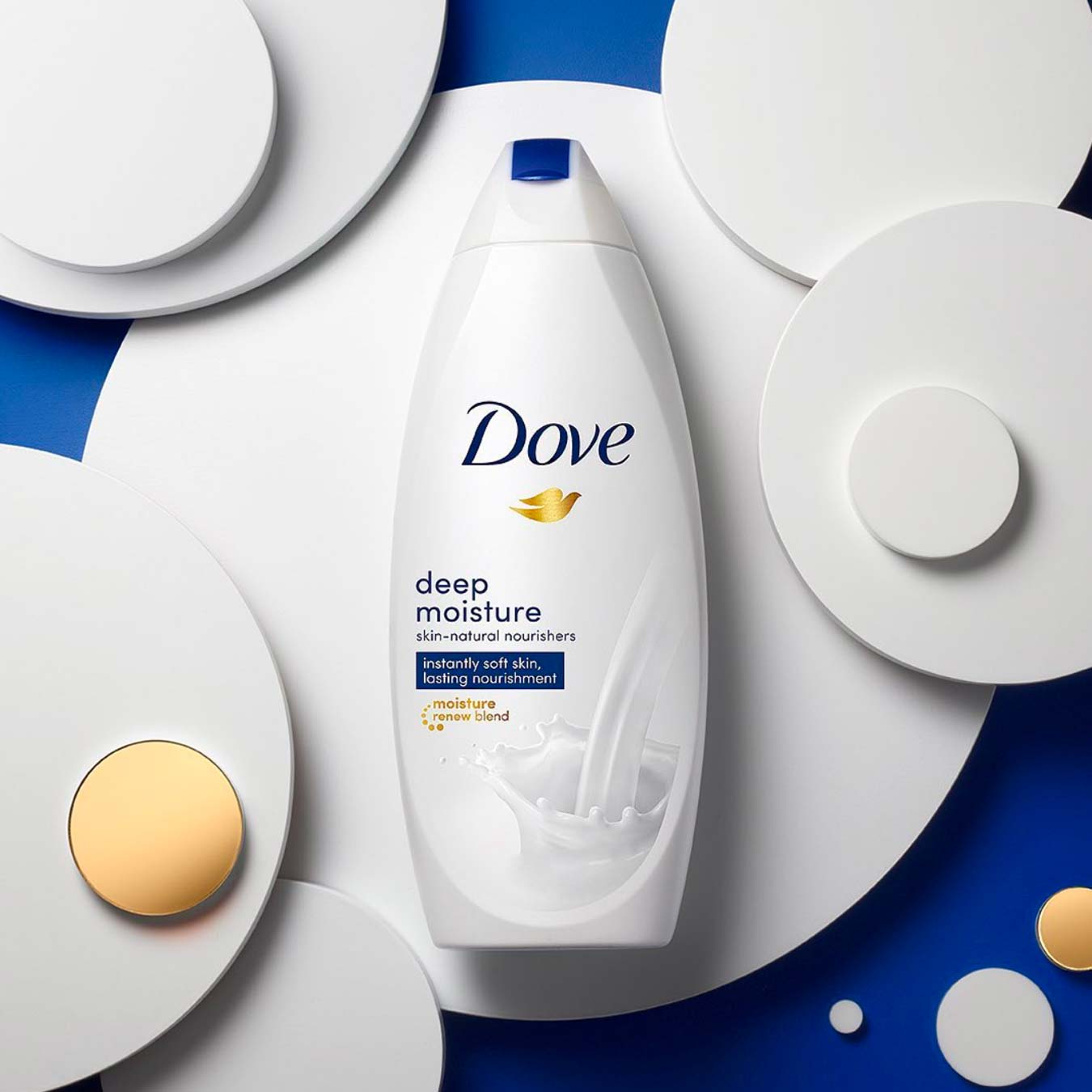
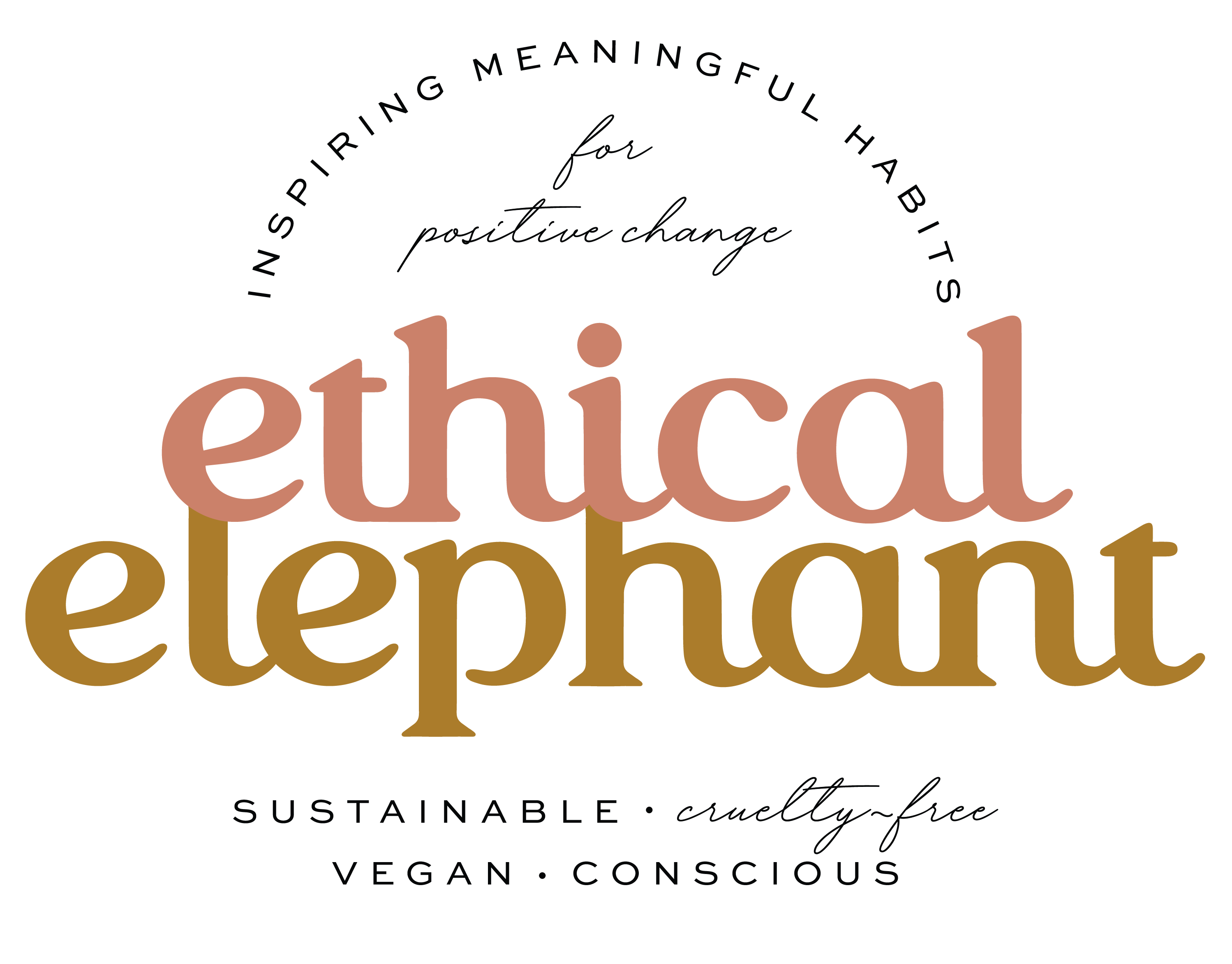
2 thoughts on “Dove (Unilever)”
Great article Vy! All the information is there to make our own mind about the compagnie.
I’m excited to see Dove make the switch to cruelty-free and vegan products in 2023!